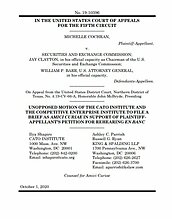Learn more about Cato’s Amicus Briefs Program.
In April 2016, the SEC commenced an enforcement proceeding against Michelle Cochran for alleged violations of accounting regulations. The proceeding took place before an administrative law judge who was reported at the time to have said to defendants that “they should be aware he had never ruled against the agency’s enforcement division.” True to his word, the SEC judge ruled in the government’s favor. Ms. Cochran was fined $22,500 and banned from practicing as an accountant for at least five years.
But before the SEC could finalize its order against Ms. Cochran, the Supreme Court ruled in Lucia v. SEC that administrative law judges are “inferior officers” subject to the Appointments Clause. Because SEC judges had not been appointed by the “President alone…Courts of Law, or…Heads of Departments”—as required by Article II—the Supreme Court invalidated all ongoing administrative enforcement proceedings before the SEC, including the one against Ms. Cochran.
After Lucia, the SEC attempted to cure this constitutional defect by “ratifying” its administrative law judges’ prior appointments. The problem is that by addressing its Appointments Clause violation, the SEC violated constitutional requirements regarding the removal of officers. In Free Enterprise Fund v. PCOB, the Supreme Court held that “officers” of the United States may not be insulated from presidential control by more than one layer of tenure protection. Yet the SEC’s judges enjoy employment protections, and they are removable by SEC commissioners, who also enjoy employment protections. That is, the SEC’s administrative law judges are “officers” with at least two layers of tenure protections and, therefore, run afoul of the Supreme Court’s reading of the president’s removal authority, as set forth in Free Enterprise Fund.
In early 2019, with the help of the New Civil Liberties Alliance, Ms. Cochran filed suit against the SEC in a federal district court in Texas, arguing that she should not have to undergo a second unconstitutional enforcement proceeding. Three months later, the district court dismissed her case; Ms. Cochran appealed. Last August, a three-judge panel of the Fifth Circuit upheld the district court’s decision. Now, Ms. Cochran seeks review before the entire Fifth Circuit court.
Building on our prior participation in this case, the Cato Institute, joined by the Competitive Enterprise Institute, today filed a brief in support of Ms. Cochran. We argue that because Congress cannot have intended to strip district courts of jurisdiction to review Ms. Cochran’s constitutional injury, the Fifth Circuit should allow this case to proceed.

This work is licensed under a Creative Commons Attribution-NonCommercial-ShareAlike 4.0 International License.
